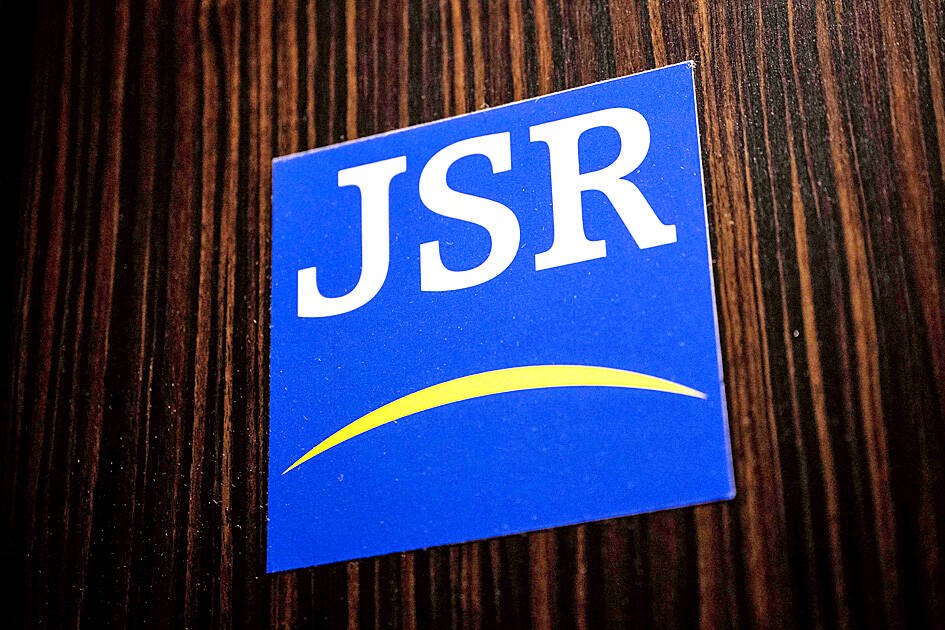The Japanese government unveiled a US$6.3 billion deal to buy out and privatize JSR Corp, taking control of the world leader in chipmaking compounds at a time US-China tensions threaten to fragment the US$550 billion global semiconductor industry.
Government-backed Japan Investment Corp plans to offer shareholders ¥4,350 per share in a tender offer in December, the company said yesterday in a statement.
That works out to as much as ¥903.9 billion (US$6.3 billion), JSR said.

Photo: AFP
The move could facilitate Tokyo’s control over compounds essential for making advanced semiconductors.
Founded in 1957, JSR is the world’s leading maker of photoresists and one of three Japanese companies, along with Shin-Etsu Chemical Co and Tokyo Ohka Kogyo Co, that control the global supply of fluorinated polyimide and hydrogen fluoride.
Those compounds are needed to make semiconductors used in supercomputers, artificial intelligence-harnessing data centers and missile control systems, as well as gadgets including Apple Inc iPhones.
Government control over the materials critical to powerful chips would grant Japan greater leverage in a world increasingly divided by an escalating US-China technological rift.
An unlisted JSR backed with public funds could also take more long-term risks to expand market share.
JSR shares surged 22 percent yesterday after Japan’s Nikkei Shimbun reported on the deal, the most since 1999.
JSR peer Shin-Etsu jumped 1.5 percent and Tokyo Ohka Kogyo surged 9.1 percent to a record high.
“The point is to make the most of this position of strength. So the government is continuing these strategic investments,” University of Tokyo Graduate School of Public Policy professor Kazuto Suzuki said.
“If the government takes it over, it won’t be exposed to the risk of a buyout from overseas. So it becomes a national policy company,” Suzuki said.
Japanese Prime Minister Fumio Kishida’s administration is betting shifting geopolitical priorities would help Japan regain some of its long-lost leadership in semiconductors.
Japan is preparing billions of US dollars in subsidies as part of a push to triple domestic production of chips by 2030.
Growing tech protectionism is spurring policymakers globally to go upstream in the supply chain to find more chokeholds to control technologies.
In October last year, the US spearheaded a push to limit China’s access to advanced semiconductors, and its allies have since stepped up efforts to curb exports on equipment and technology.
Germany has discussed limiting the export of chip chemicals to China. Such a move would restrict sales of materials by companies such as Merck KGaA and BASF SE, slowing China’s innovation.
Japan, which seeks to raise its profile as a chip supplier, still commands leading market share in some little-known, but essential parts of the chip supply chain — a legacy from when Japan led the world in semiconductor technology in the 1980s.
Tokyo tightened control over exports of chip chemicals in 2019, roiling South Korea’s biggest companies and prompting Seoul to file a complaint to the WTO.
The restrictions did little to affect shipments of the materials to chipmakers Samsung Electronics Co and SK Hynix Inc, but the move was seen as a threat to hurt Seoul economically.
“The semiconductor materials business is becoming increasingly important as a matter of national policy,” SMBC Nikko Securities Inc analyst Go Miyamoto wrote in a note.
Valuations for other semiconductor materials stocks would likely increase “if investors start to price in similar possible acquisitions,” Miyamoto wrote.

Zhang Yazhou was sitting in the passenger seat of her Tesla Model 3 when she said she heard her father’s panicked voice: The brakes do not work. Approaching a red light, her father swerved around two cars before plowing into a sport utility vehicle and a sedan, and crashing into a large concrete barrier. Stunned, Zhang gazed at the deflating airbag in front of her. She could never have imagined what was to come: Tesla Inc sued her for defamation for complaining publicly about the vehicles brakes — and won. A Chinese court ordered Zhang to pay more than US$23,000 in

Taiwan Semiconductor Manufacturing Co (TSMC, 台積電) yesterday said that its investment plan in Arizona is going according to schedule, following a local media report claiming that the company is planning to break ground on its third wafer fab in the US in June. In a statement, TSMC said it does not comment on market speculation, but that its investments in Arizona are proceeding well. TSMC is investing more than US$65 billion in Arizona to build three advanced wafer fabs. The first one has started production using the 4-nanometer (nm) process, while the second one would start mass production using the

US President Donald Trump has threatened to impose up to 100 percent tariffs on Taiwan’s semiconductor exports to the US to encourage chip manufacturers to move their production facilities to the US, but experts are questioning his strategy, warning it could harm industries on both sides. “I’m very confused and surprised that the Trump administration would try and do this,” Bob O’Donnell, chief analyst and founder of TECHnalysis Research in California, said in an interview with the Central News Agency on Wednesday. “It seems to reflect the fact that they don’t understand how the semiconductor industry really works,” O’Donnell said. Economic sanctions would

‘NO DISRUPTION’: A US trade association said that it was ready to work with the US administration to streamline the program’s requirements and achieve shared goals The White House is seeking to renegotiate US CHIPS and Science Act awards and has signaled delays to some upcoming semiconductor disbursements, two sources familiar with the matter told reporters. The people, along with a third source, said that the new US administration is reviewing the projects awarded under the 2022 law, meant to boost US domestic semiconductor output with US$39 billion in subsidies. Washington plans to renegotiate some of the deals after assessing and changing current requirements, the sources said. The extent of the possible changes and how they would affect agreements already finalized was not immediately clear. It was not known